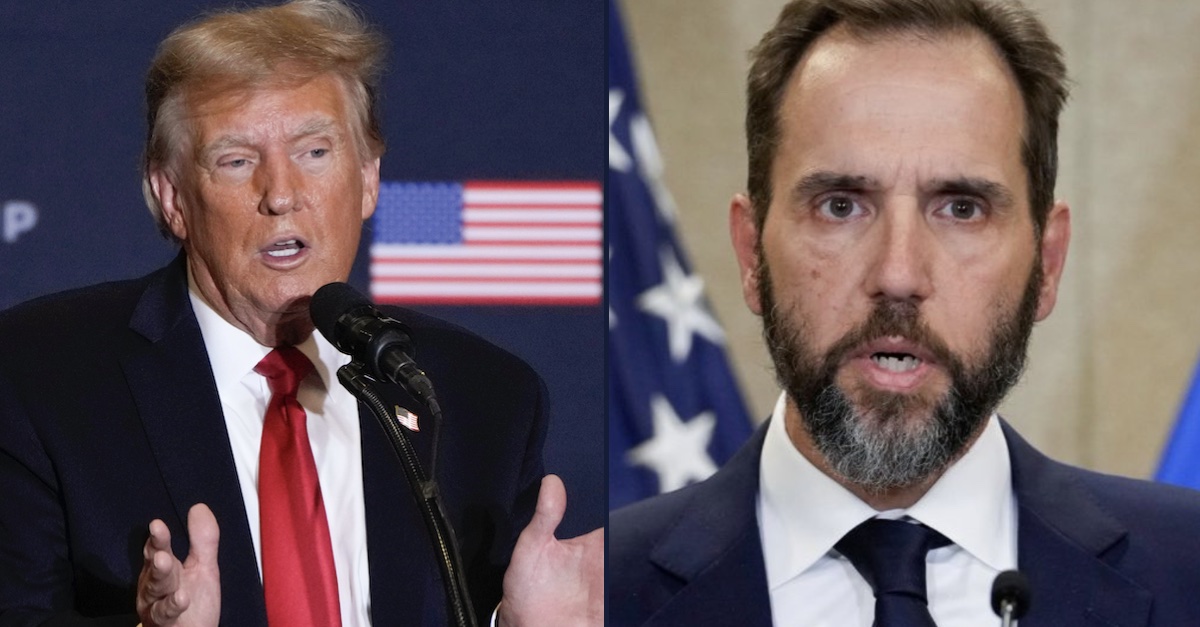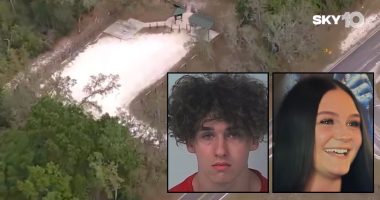
Left: Donald Trump (AP Photo/Charlie Neibergall); Right: Jack Smith (AP Photo: J. Scott Applewhite)
Special counsel Jack Smith on Friday asked the judge in charge of the Mar-a-Lago documents case to impose a gag order on former president Donald Trump.
The government aims to prohibit the defendant from making statements “that pose a significant, imminent, and foreseeable danger to law enforcement agents” involved in the case, according to a 12-page motion of modification of conditions of release.
The request stems from a recent Truth Social post in which the 45th president claimed the Department of Justice authorized the use of “deadly (lethal) force” during the federal raid of his Palm Beach estate.
“Trump’s conditions of release should therefore be modified to prohibit similar communications going forward,” Smith argues.
The prosecution claims Trump’s defense counsel complained about the timing of the motion because of the long, holiday weekend, and due to the lack of “imminent danger,”according to a footnote. The motion counters that “Trump has continued to issue false statements smearing and endangering the agents who executed the search” by re-posting at least one other similar claim on his homegrown social media website.
“The Government’s request is necessary because of several intentionally false and inflammatory statements recently made by Trump that distort the circumstances under which the Federal Bureau of Investigation planned and executed the search warrant at Mar-a-Lago,” the motion reads. “Those statements create a grossly misleading impression about the intentions and conduct of federal law enforcement agents—falsely suggesting that they were complicit in a plot to assassinate him—and expose those agents, some of whom will be witnesses at trial, to the risk of threats, violence, and harassment.”
Smith’s filing cites the court’s “independent obligation to protect the integrity of this judicial proceeding” and implores U.S. District Judge Aileen Cannon to issue a gag order that will “immediately” put a “halt” to “this dangerous campaign to smear law enforcement.”
More Law&Crime coverage: The Trump Docket: The ‘collateral consequences’ of a Trump conviction must not supersede justice, expert prosecutor says
In making the government’s case, the special counsel cites the limited gag order allowed on Trump’s speech in his Washington, D.C.-based prosecution over the attack on the U.S. Capitol on Jan. 6, 2021.
In a December 2023 opinion, the D.C. Circuit Court of Appeals partially upheld a gag order issued by U.S. District Judge Tanya Chutkan.
The gag order request uses language from that opinion to make the latest case for restriction on the ex-president’s speech, at length:
Trump “himself recognizes the power of his words and their effect on his audience, agreeing that his supporters ‘listen to [him] like no one else.’”And his “documented pattern of speech and its demonstrated real-time, real-world consequences,” have often posed significant, imminent and foreseeable threats to witnesses, particularly where, as here, they include deceptive and inflammatory claims. Those risks have justified restrictions on Trump’s extrajudicial speech in other proceedings precisely to prevent threats, harassment, and other harms that undermine judicial proceedings.
“The Court should exercise its authority to impose a condition that Trump may not make public statements that pose a significant, imminent, and foreseeable danger to the law enforcement agents participating in the investigation and prosecution of this case,” the special counsel’s motion advises.
More Law&Crime coverage: ‘Matters he knows nothing about’: Court scorches Trump valet’s attempt to get tranche of grand jury materials to Mar-a-Lago judge
The government concedes, again citing the appellate court ruling upholding Chutkan’s gag order, that “context” is key to whether a statement passes muster for restriction on speech – but says that is clearly no obstacle here.
“[T]hat condition would clearly prohibit further statements deceptively claiming that the agents involved in the execution of the search warrant were engaged in an effort to kill him, his family, or Secret Service agents,” the motion goes on. “As such, the condition is ‘sufficiently clear and specific to serve as a guide for the person’s conduct,’ and it ‘gives sufficient warning that [he] can conform [his] conduct to the law and avoid that which is forbidden.””
The government’s motion also ridicules the basic claim being floated by Trump and his fellow travelers online: that the language in the search warrant was anything other than routine, law enforcement boilerplate.
“[T]he FBI used a form that contains standard and unobjectionable language setting out the Department of Justice’s use-of-force policy, which prohibits the use of deadly force except ‘when the officer has a reasonable belief that the subject of such force poses an imminent danger of death or serious physical injury to the officer or to another person.’” the motion reads. “The inclusion of that policy is routine practice to restrict the use of force, and it is attached to countless warrants across the country.”
Smith’s filing says the nature in which the search warrant was executed at Mar-a-Lago was, by and large, relatively congenial.
“As Trump is well aware, the FBI took extraordinary care to execute the search warrant unobtrusively and without needless confrontation: they scheduled the search of Mar-a-Lago for a time when he and his family would be away; they planned to coordinate with Trump’s attorney, Secret Service agents, and Mar-a-Lago staff before and during the execution of the warrant; and they planned for contingencies—which, in fact, never came to pass—about with whom to communicate if Trump were to arrive on the scene,” the filing goes on.
More Law&Crime coverage: ‘We decline’: Trump gag order upheld in hush-money case as appeals court cites Jan. 6 judge’s instruction to keep witnesses ‘free from threats, intimidation, harassment, and harm’
Smith’s motion says the restrictions requested would not run afoul of the First Amendment due to longstanding exceptions that limit the rights of criminal defendants to communicate in ways that could negatively impact the trial process – such as not to communicate with witnesses unless in the presence of counsel.
The government summed up its argument in conclusion.
“The law enforcement agents participating in this case conducted the search in an appropriate and professional manner, subject to the Department of Justice’s standard use-of-force policy,” the filing concludes. “Trump’s repeated mischaracterization of these facts in widely distributed messages as an attempt to kill him, his family, and Secret Service agents has endangered law enforcement officers involved in the investigation and prosecution of this case and threatened the integrity of these proceedings. A restriction prohibiting future similar statements does not restrict legitimate speech.”
Have a tip we should know? [email protected]








